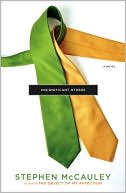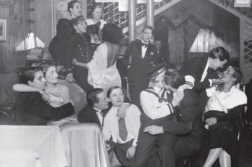 Insignificant Others: A Novel
Insignificant Others: A Novel
by Stephen McCauley
Simon & Schuster. 243 pages, $25.
Stephen McCauley’s fans are known to look forward to his next novel with anticipation, and it’s a pleasure to say that his sixth novel, Insignificant Others, is well worth the wait. Set a few years ago in Boston and Cambridge, it features Trollope-scholar-turned-psychologist-turned-HR-specialist Richard Rossi as the narrator and leading character. Richard’s partner of eight years, Conrad, co-owns a design firm with Doreen—a time-bruised character who, when offered a taste of chowder at a chain restaurant, says: “Like a lot of life’s pleasures, it’s one I prefer to enjoy vicariously.” Richard and Conrad’s relationship, though entirely affable, is not one for the ages. Not so incidentally, Richard is carrying on a love affair with Benjamin, a bisexual, and seriously encumbered, architect. “But for the sake of his family,” McCauley writes of Benjamin, “he might have resolved to keep his wayward urges more tightly bottled up forever, but such resolutions usually start in church and end in a sting operation at a highway rest stop bathroom.” Entering the mix are family (Richard’s sister, usually surrounded by “traumatized rescue dogs” dashing around her ankles), friends (from his gym, where he revels in a near-addiction to exercise, abetted by his Brazilian trainer Walmi, whose own story merits a novel all to itself), and coworkers at a Cambridge software company (an assortment of characters, from the fundamentalist Christian to the Goth techie). Under all the amusing dialogue, McCauley plays with some serious ideas. Who is really significant to a person, and who is not? How much baggage can we heave as we try to restart our middle-aged lives? While this novel is far more French farce than philosophy, these questions may give the reader something to ponder.
Martha E. Stone
 Missouri
Missouri
by Christine Wunnicke
Translated by David Miller
Arsenal Pulp Press. 134 pages, $12.95
This historical novel, set in the American Midwest during the 19th century, tells the story of two very unusual men coming together. Douglas Fortescue is a successful English poet who, fleeing accusations of sexual impropriety, has escaped to the seeming safety of America. Joshua Jenkyns is a wild, young outlaw, leader of his own gang who, against his father’s wishes, learned how to read, starting with Lord Byron’s poetry and moving on to none other than Douglas Fortescue. When Josh kidnaps Douglas during a stagecoach robbery, he begins an adventure that brings these two dissimilar men together in a manner neither ever expected. One of the most fascinating parts of this novel is Josh’s insistence that the Missouri River is the source of Douglas’ poems, based on the line he has memorized: “A swamp, a river, a muddy brown like coffee.” While Josh assumes that Douglas must have known about the river in order to describe it so accurately, the poet himself never saw it until his abduction. As with all of his poetry, he got his vision of the river under the influence of opium and other mind-altering drugs. Christine Wunnicke successfully captures the rugged nature of the American frontier and the hard existence most residents endured. She slowly develops the relationship between Douglas and Josh, starting from apprehension on both sides, then moving to almost childlike affection, and finally to a passionate love affair. By the end of the novel, Douglas is forced to choose between his family, which seeks to rescue him from his kidnapper, and Josh, whom he has come to genuinely love. Missouri blends Americans and Englishmen, guns and poetry, cowboys and aristocrats, creating a compelling work that’s both entertaining and thought-provoking. David Miller has produced a faithful translation from the German that flows well in English.
Charles Green





